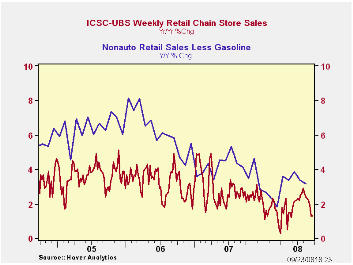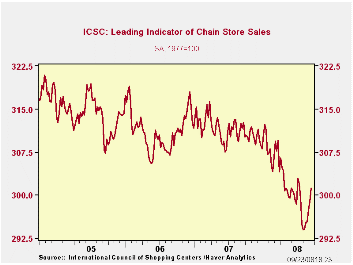 Global| Sep 23 2008
Global| Sep 23 2008U.S. Shoppers Tightened Their Purse Strings
by:Tom Moeller
|in:Economy in Brief
Summary
The International Council of Shopping Centers reported that chain store sales fell 1.0% last week after an even sharper 1.6% drop during the week prior. The weakness of sales for September so far is reflected in a decline which [...]


The ICSC-UBS retail chain-store sales index is constructed using the same-store sales (stores open for one year) reported by 78 stores of seven retailers: Dayton Hudson, Federated, Kmart, May, J.C. Penney, Sears and Wal-Mart.
The leading indicator of chain store sales from ICSC-UBS improved 0.8% (-3.4% y/y). The latest was the highest level since mid-July. The chain store sales figures are available in Haver's SURVEYW database.Do Oil Prices Directly Affect the Stock Market? from the Federal Reserve Bank of Cleveland is available here.
Trend Unemployment and What It Says about Unemployment Patterns, also from the Federal Reserve Bank of Cleveland can be found here.
| ICSC-UBS (SA, 1977=100) | 09/20/08 | 09/13/08 | Y/Y | 2007 | 2006 | 2005 |
|---|---|---|---|---|---|---|
| Total Weekly Chain Store Sales | 481.7 | 486.6 | 1.3% | 2.8% | 3.3% | 3.6% |
Tom Moeller
AuthorMore in Author Profile »Prior to joining Haver Analytics in 2000, Mr. Moeller worked as the Economist at Chancellor Capital Management from 1985 to 1999. There, he developed comprehensive economic forecasts and interpreted economic data for equity and fixed income portfolio managers. Also at Chancellor, Mr. Moeller worked as an equity analyst and was responsible for researching and rating companies in the economically sensitive automobile and housing industries for investment in Chancellor’s equity portfolio. Prior to joining Chancellor, Mr. Moeller was an Economist at Citibank from 1979 to 1984. He also analyzed pricing behavior in the metals industry for the Council on Wage and Price Stability in Washington, D.C. In 1999, Mr. Moeller received the award for most accurate forecast from the Forecasters' Club of New York. From 1990 to 1992 he was President of the New York Association for Business Economists. Mr. Moeller earned an M.B.A. in Finance from Fordham University, where he graduated in 1987. He holds a Bachelor of Arts in Economics from George Washington University.
More Economy in Brief
 Global| Feb 05 2026
Global| Feb 05 2026Charts of the Week: Balanced Policy, Resilient Data and AI Narratives
by:Andrew Cates






